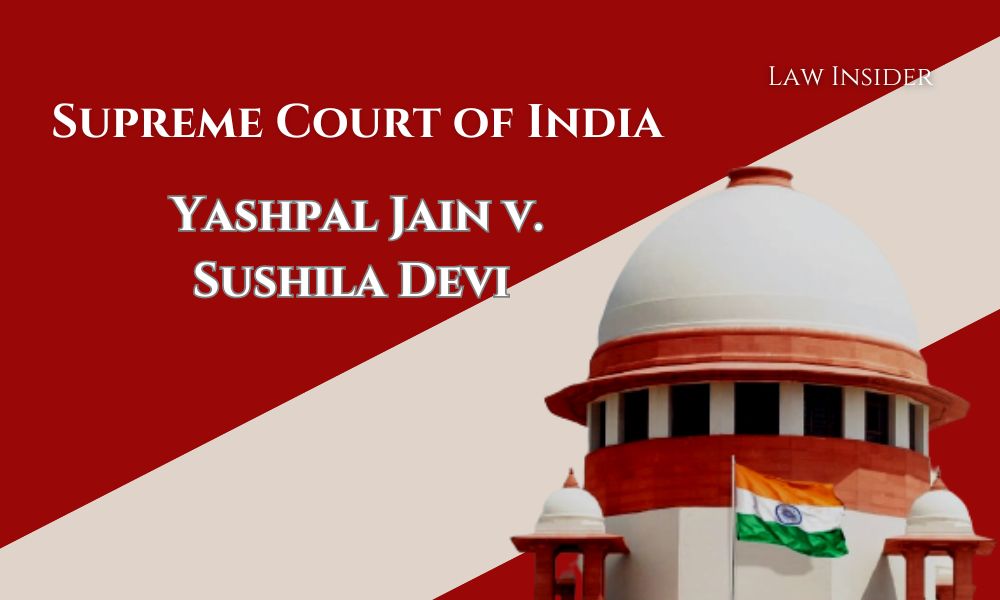By LI Research
Published on: October 25, 2023 at 11:54 IST
The Supreme Court of India’s judgment in the case of Yashpal Jain v. Sushila Devi and others stands as a historic milestone in the Indian legal landscape. This landmark decision has the potential to revolutionize the country’s legal system and serves as a resounding reaffirmation of the fundamental right to a speedy trial as enshrined in Article 21 of the Constitution of India. The judgment’s far-reaching directives reflect a dedicated commitment to ensuring that justice is delivered in a timely and efficient manner, addressing the chronic issue of case backlog that has plagued the Indian judiciary.
The Crisis of Pendency
The staggering backlog of cases in Indian courts has been a longstanding and pressing concern. It has left millions of citizens awaiting justice for extended periods, which not only deprives them of their fundamental rights but also inflicts profound social and economic consequences on their lives and livelihoods. The prolonged delays in delivering justice have eroded public confidence in the legal system, rendering the right to a speedy trial more crucial than ever.
The Yashpal Jain Case and Its Impact
In the Yashpal Jain case, the Supreme Court confronted the extensive backlog of cases that had afflicted Indian courts. The Court’s response was the issuance of a comprehensive set of 12 directives designed to ensure a speedy trial. These directives span the entire spectrum of the trial process, from the timely service of summons to the final pronouncement of judgment.
Key among these directives is the imperative for all courts to ensure the prompt execution of summons, ensuring that parties to a case are adequately informed of the proceedings and can actively participate in the trial. The Court also mandated that written statements be filed within the stipulated time frame and that trials proceed on a day-to-day basis to the extent possible.
Another noteworthy aspect of the judgment is its emphasis on the role of alternative dispute resolution (ADR) mechanisms in alleviating case backlog. The Court has urged the courts to encourage litigants to consider ADR options like mediation and conciliation before initiating formal trials, aiming to expedite the resolution process. Additionally, the Court instructed the lower courts to expedite the framing of issues in a case, ideally within one week of the completion of pleadings.
The directives also underscore the importance of an efficient and effective trial process. To this end, the Court has recommended the avoidance of unnecessary adjournments and the immediate and continuous hearing of oral arguments at the conclusion of the trial. Furthermore, the courts are required to pronounce judgments within the specified timeframe as outlined in the Code of Civil Procedure.
Crucially, the Court has introduced a system of accountability for the lower courts. These courts are now obligated to regularly report their case disposal progress to the respective High Courts. This step is pivotal in ensuring the lower courts are held responsible for their performance, while also allowing the High Courts to take corrective measures where necessary.
Implications for the Indian Legal System
The Yashpal Jain judgment carries several significant implications for the Indian legal system:
1. Reaffirmation of Speedy Trial as a Fundamental Right: The judgment reinforces the recognition of a speedy trial as a fundamental right. It underscores the constitutional commitment to ensuring justice is swift and effective.
2. Guidance to Lower Courts: The judgment provides clear, practical guidance to lower courts on how to expedite trial processes and reduce case backlog. It serves as a valuable resource for judicial officers and administrators tasked with streamlining court proceedings.
3. Accountability: The introduction of reporting mechanisms creates a sense of accountability for lower courts. This accountability will likely promote a more efficient and proactive approach to case management.
4. Relief for Litigants: With the lower courts under pressure to expedite case proceedings, litigants can expect their cases to be heard and decided more promptly. This will bring a sense of relief to countless individuals and entities waiting for justice.
A Ray of Hope
The Yashpal Jain judgment is more than a legal decision; it is a ray of hope for those who have been mired in the judicial backlog. It serves as a poignant reminder that the Supreme Court is unwavering in its commitment to upholding the fundamental rights of all Indian citizens, including the right to a speedy trial. The successful implementation of these directives will be closely monitored and is poised to be a critical step towards reducing case backlog and ensuring that justice is served swiftly.
In conclusion, the judgment in the Yashpal Jain case represents a landmark moment in the pursuit of a more efficient and responsive legal system in India. It underscores the principles of fairness, justice, and efficiency and renews faith in the Indian judiciary’s dedication to upholding the rule of law. It stands as a testament to the essential role of the judiciary in safeguarding the rights and well-being of the Indian populace.

